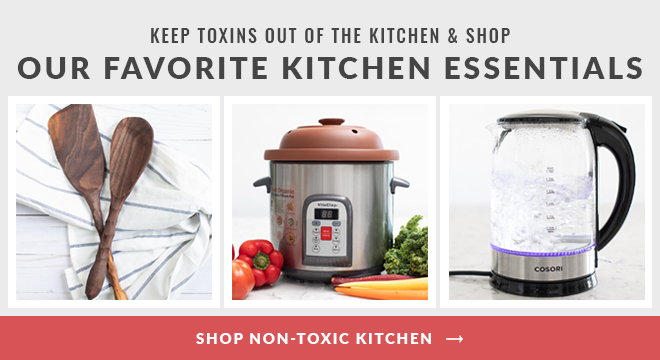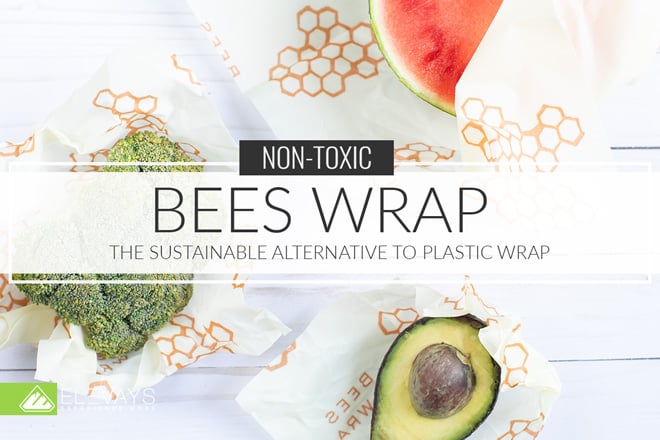
There are few things we love more than a genuine company, so when we found Bee’s Wrap, it’s safe to say we fell head over heels.
This entire article might as well be a love letter to the Green America certified company, so if you’re not into old-school romantics, you’ll just have to take my word for it when I say “get yourself some Bee’s Wrap products.”
TRUTH BOMB:
You’re
Already killing it!
If You Were More Consistent With Your Wellness Routine, You’d Be Unstoppable.
But if you dig a little love story, and want to get in on the fest, don’t stop scrolling–this love story has a happy ending for all.
Dear Bee’s Wrap,
We love you for many reasons, but for starters, we love you because of your roots. Founded in 2012 by Sarah Kaek–seamstress, gardener, mother of chickens, goats, and three humans– Bee’s Wrap was the answer to conscious folks’ questions everywhere: How can we eliminate plastics in our kitchen in favor of a healthier, more sustainable way to store our food?
It was the infusion of organic cotton with organic jojoba oil, beeswax, and tree resin which allowed home cooks, lunch-packers, and eco-friendly families everywhere to let out a sigh of relief: It is possible to store food in something washable, reusable, compostable and non-toxic! Kaek, the Vermont native, re-birthed a lost tradition and created a sustainable alternative to plastic wrap. And it was magic.
Now, if you’re wondering why people everywhere went ‘phew’ while simultaneously wiping their brows– let me introduce you to reasons number 2 and 3 why we love Bee’s Wrap: good for our bodies and good for our earth.
Good for Our Bodies
Before Bee’s Wrap, most of us were unfortunately bound to an unhealthy and unsustainable relationship with Ziploc products. Without those convenient little baggies, what would we pack the kids lunches in?! How would we freeze this or reheat that?!!
Toxins in Plastic
But therein lies one of the main problems with plastic wrap and baggies: the chemicals they contain leach into the food we eat. Even worse, when we reheat or freeze food with plastic, the plastic releases dioxins a.k.a cancer-causing chemicals (1). Dioxins are detrimental to our cells, but those aren’t the only problems lurking in plastics. Here’s what else:
BPA AND BPS
You’re probably already familiar with Bisphenol A (BPA). Plastics like BPA and BPS are known endocrine disruptors, which means they mimic estrogen and throw your hormones out of whack. The toxic effects of BPA and BPS are well-documented. While a lot of brands are taking BPA out of their plastic products, many are not- and it’s most likely still in your plastics. Here is why you should ditch plastic food storage containing BPA:
- BPA causes male reproductive dysfunction
- BPA studies show that the population most at risk is fetuses
- Studies have shown that BPA can produce several defects in the embryo
- Long term exposure to BPA can lead to endocrine disorders in women: morphological changes in ovary, uterus, vagina, and oviducts (all linked to fertility issues– which are higher than ever)
- BPA is linked to breast cancer tumors
BPS is not any better, though. Recent reports found that 80% of Americans have detectable levels of BPS in their urine and blood. Studies also found that it can lead to diabetes, obesity, birth defects, asthma, and cancer. What’s important to note here is that just because something is labeled BPA-free, doesn’t mean that it is safe (2).
PHTHALATES
Phthalates are chemical compounds used to increase durability, flexibility, and transparency in products. Just like BPA and BPS, phthalates will wreak havoc on your endocrine system. Excess hormones lead to hormone imbalance, which leads to a host of health issues. The population most susceptible to phthalate danger is young children and while its use is banned in the EU, phthalates are still extremely common in the US and that’s why it is so important to ditch your toxic relationship with plastic and switch to Bee’s Wrap (3, 4).
Problems associated with phthalates:
- Increased insulin resistance
- Decreased sex hormones in infants
- Female and male infertility
- Hormone disruption
Just like a good friend who loves you and wants what is best for you, thank you Bee’s Wrap for saving us from this toxic relationship. And thank you for being kinder to our home Mother Earth.
Good for Our Earth
An article title in National Geographic says it best: “We made plastic. We depend on it. Now we’re drowning in it.” Subtitle: “The miracle material has made modern life possible. But more than 40 percent of it is used just once, and it’s choking our waterways.”
There’s no denying that many of us know the outrageous effects plastic has on our environment. Unfortunately, most of us choose to ignore it because we don’t physically see the 6.4 billion tons of waste piling up on beaches and floating in the oceans that never made it to the recycle bin (5).
Think about it this way: the million tons of plastic that end up in our oceans each year slurp up even more toxins that weren’t already in them and break down into tiny pieces. Those toxic pieces end up in marine life, which ultimately ends up in our bodies (5).
Don’t eat seafood? Maybe you’re a vegetarian for moral reasons? How about that the plastic we carelessly use has affected almost 700 species, including endangered ones- and this is just the amount we know for sure (5).
The point here is that 1% of plastic bags are recycled and the truth is, most are recycled improperly. Meaning, they still end up in landfills where their toxins are carried by wind and water- producing negative effects on us humans once again (6).
And let’s be honest, most people aren’t reusing their sandwich bags or their snack bags. And if you are, then it will be even easier for you to make the switch to a healthier, more sustainable alternative.
Our Favorite Bee’s Wrap Products
Here at Elevays, it’s our mission to make natural living easy. That’s why we choose only the best products to make available in our one-stop non-toxic shop. Having Bee’s Wrap in our store feels like we are doing our small part in saving future generations’ health and homes. That and the products are totally cute and super awesome.
Bee’s Wrap Sandwich
Shop Sandwich Wrap ➝
1 sandwich wrap is 13″ x 13″ (33 x 33 cm).
As we already learned: plastic wrap, sandwich baggies, and aluminum foil have toxic chemicals that are horrible for our health and terrible for our environment. These reusable sandwich wraps made from beeswax are perfect for lunch on the go- or for wrapping up leftovers!
This natural alternative to plastic wrap for food storage will create a perfect seal. Use the warmth of your hands to soften the wrap, and when cooled, the wrap will hold its shape perfectly.
Bee’s Wrap Bread
Shop Bread Wrap ➝
1 bread wrap is 17″ x 23″ (43 x 58 cm).
This Bee’s Wrap for bread will keep your bread fresh for days. But it’s not just for bread. Cover a large bowl to bring to a party or store leftovers- the options are endless with this large wrap.
This natural alternative to plastic wrap is perfect for food storage. Friendly to your food, friendly to our earth.
Bee’s Wrap Singles
Shop Assorted Single Wrap Pack ➝
SINGLE Small 7″ x 8″ (17,5 x 20 cm)
Wrap halves of lemons, avocados, and onions!
SINGLE Medium 10″ x 11″ (25 x 27,5 cm)
Wrap cheese, carrots, herbs, or cover a bowl!
SINGLE Large 13″ x 14″ (33 x 35 cm)
Wrap bread, half a melon, veggies, baked goods, or a big bowl!
So one last time, we love you Bee’s Wrap thank you for being kind to our bodies and our earth.
Love,
Elevays
Do you love your Bee’s Wrap? Was it hard breaking off your toxic relationship? If you’re still not fully there and need some support- comment below!
Sources:
- https://camelsnose.wordpress.com/2006/08/31/heating-food-in-plastic-containers-linked-to-dioxin-and-cancer/
- https://earth911.com/living-well-being/the-end-of-the-tupperware-age-choosing-safer-food-storage-containers/
- https://draxe.com/phthalates/
- Rustagi, N., Pradhan, S.K., & Singh, R. (2011) Public health impact of plastics: An overview. Indian Journal of Occupational & Environmental Medicine, 15(3), 100-103. Abstract: https://www.ncbi.nlm.nih.gov/pmc/articles/PMC3299092/
- https://www.nationalgeographic.com/magazine/2018/06/plastic-planet-waste-pollution-trash-crisis/





READ the Latest
Health Habits
Longevity
Health Habits
Health Habits